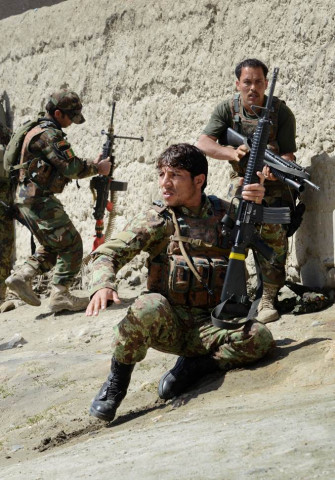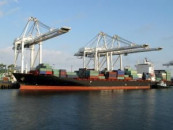Afghan forces struggle to retake Kunduz city from Taliban
Taliban have laid landmines around Kunduz, slowing movement of Afghan convoys driving to the city

PHOTO: AFP
Heavy fighting erupted near the airport on the city's outskirts as the insurgents closed in late Tuesday, highlighting the potent challenge the militants represent after their lightning capture of Kunduz the previous day.
The Afghan army was supposed to be bolstered by reinforcements for the campaign to retake the city, but attacks on convoys making their way to the city meant that backup troops were only trickling in.
"The Taliban have laid landmines and booby traps around Kunduz, slowing the movement of convoys of Afghan army reinforcements driving to the city," a security official told AFP.
He said the militants had slowly infiltrated Kunduz during the recent Eid festival, launching a Trojan horse attack that enabled them to capture the city within hours.
The fall of the provincial capital, which sent panicked residents fleeing, has dealt a major blow to Afghanistan's NATO-trained security forces and highlighted the insurgency's potential to expand beyond its rural strongholds.
US forces conducted an air strike on the city's outskirts Tuesday, and the Afghan spy agency said it coordinated further strikes overnight that killed Mawlawi Salam, the Taliban's "shadow governor" for the province, along with his deputy and 15 other fighters.
Pentagon press secretary Peter Cook said the fall of the city -- achieved by a militant force significantly smaller than the army contingent -- was "obviously" a setback but that the US believed Afghan authorities would be able to regain control.
Cook added he was "not sure it reflects any new assessment of the Taliban at this point" but many analysts view the events as a game-changer for a group many had believed was fraying, and a disaster in symbolic terms for Afghanistan and its Western allies.
Precise losses in the fighting were not known, but the Afghan health ministry said hospitals in Kunduz had so far received 16 bodies and more than 190 wounded people.
Despite the counter-strike Kunduz remained largely under Taliban control -- the first major urban centre in their grip in 14 years.
Insurgents showed off seized tanks and armoured cars, chanting "Allahu Akbar" (God is the greatest) and promising to enforce Islamic sharia law, a Taliban video showed.
The defence ministry said the police headquarters and city prison had been retaken, after marauding insurgents freed hundreds of prisoners, including some Taliban commanders.
But several other government facilities, including a 200-bed local hospital, were still under Taliban control.
President Ashraf Ghani in a televised speech said the Taliban were using civilians as human shields.
Amnesty International said the Taliban are exposing civilians to grave danger by "hiding in people's houses and conducting door-to-door searches for Afghan security personnel or government staff".
"We are scared of leaving our homes, scared of being beaten by the Taliban," said Sadiqa Sherza, head of Roshani Radio, a Kunduz media network focused on women's issues.
"There's no electricity, no water, and ration shops are all closed," she said, adding that insurgents had burned down the radio station.
The Taliban's incursion into Kunduz, barely nine months after the NATO combat mission concluded, raises troubling questions over the capacity of Afghan forces as they battle militants largely on their own.
"The upshot is that Afghan forces, despite their many improvements in recent years, remain a work in progress," said Michael Kugelman, Afghanistan expert at the Washington-based Woodrow Wilson International Center for Scholars.
"And given the extent of the Taliban threat, work in progress isn't good enough."
The fall of the city coincides with the first anniversary of President Ghani's national unity government coming to power, as it struggles to rein in the ascendant insurgency.
It will undoubtedly boost the image of new Taliban leader Mullah Akhtar Mansour within insurgent ranks as he seeks to draw attention away from internal rifts over his leadership.
Kunduz province, which borders Tajikistan and is a major transport hub for the north of the country, could offer the Taliban a critical new base of operations beyond their traditional southern strongholds.
"In the long run, we may not be able to retain control but this victory will dispel the Afghan government's belief that we are strong only in areas bordering Pakistan," a prominent Taliban commander told AFP Tuesday on the condition of anonymity.
The militant group has been largely absent from cities since being driven from power by the US and its allies, but has maintained often brutal rule over swathes of the countryside.
The Taliban stepped up attacks during a summer offensive launched in late April against the Western-backed government in Kabul.



















COMMENTS
Comments are moderated and generally will be posted if they are on-topic and not abusive.
For more information, please see our Comments FAQ